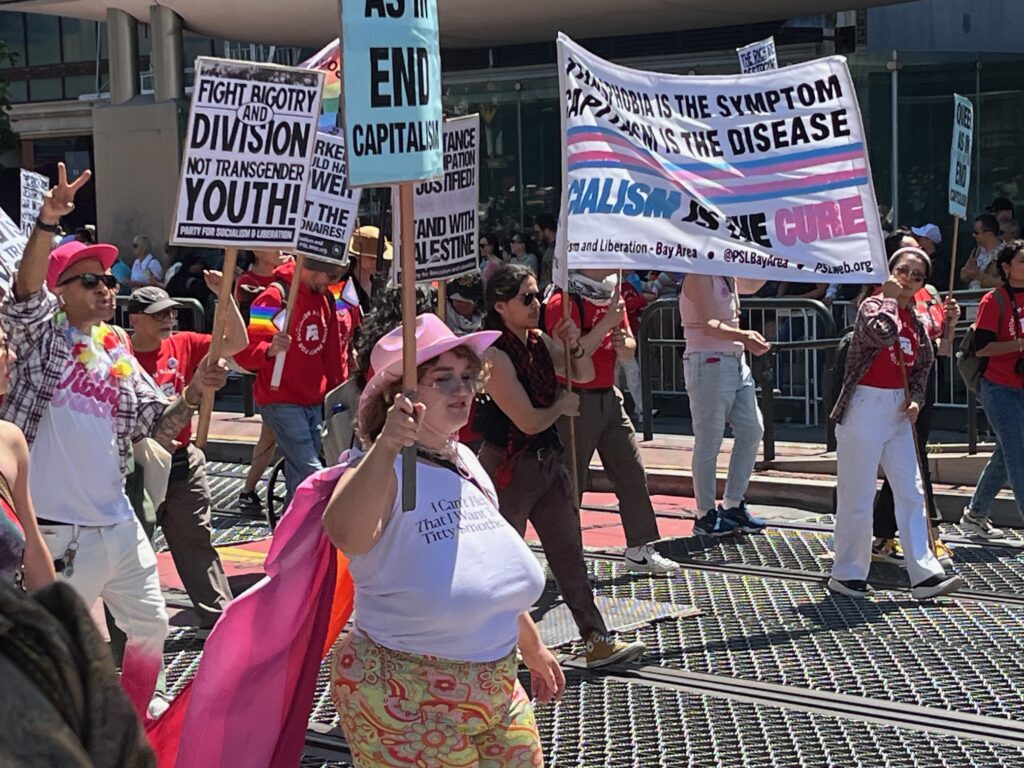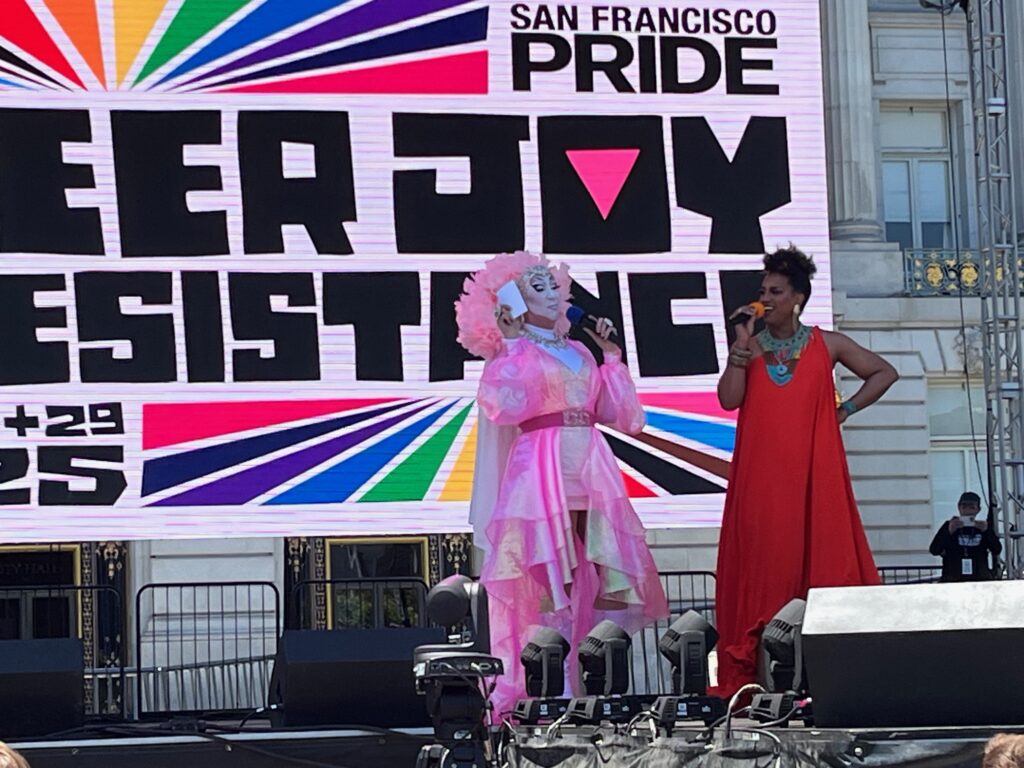It was a beautiful day for a parade, warn but not too hot, nice breeze, and plenty of sunshine. Pride was festive and fun, with great floats and great performances (what Cheer SF does on that relatively small stage is amazing, but also a little nerve-wracking….)
But while some of the marchers had anti-Trump messaging, overall, the celebration was far less political than I expected. (Not the case at the Trans March, where Mayor Daniel Lurie was booed and had to leave.) I walked around Civic Center Plaza for several hours looking for anti-Trump signs, and I saw almost none. That may be protest fatigue; for one day, the slogan “Queer Joy is Resistance” seemed enough.

From the stage, Sister Roma and Honey Mahogany talked about a “dark time.”
“Our community is under attack and all of our civil rights are under attack,” Mahogany said.

“But we always win, we lead with love,” Sister Roma said.
Lurie showed up, dressed in a white shirt and a white tie (you can’t find anything colorful for Pride?) and was met with scattered boos. He made a short statement about the importance of the LGBTQ+ community, said nothing about resisting Trump, and left.

In the time I was there, nobody said a word about Hilary Rivers, a drag performer apparently snatched by ICE right after the Miss and Mister Safe Latino pageant. The Chron reports that Rivers is now in custody in San Bernadino.
Lurie has made no statement about the case. Sup. Rafael Mandelman told me it’s “pretty awful” and he’s helping put together a rally for later today. Sup. Matt Dorsey said it was “terrible” and offered to use his contacts in SFPD to try to find out more information. As of today, they had none.
The Assembly Housing Committee will hear Wednesday/2 a bill by state Sen. Scott Wiener that would make it easier for developers to build luxury housing near transit—and potentially make it easier to demolish existing rent-controlled housing.
SB 79 cleared the Senate by just one vote, with most of the state’s tenant groups opposed. It would, as Wiener likes, override local zoning controls to allow taller buildings near transit sites.
Since much of San Francisco has (for now) robust public transit, it’s possible the bill would apply to most sites in the city.
None of the new housing, which is supposed to help the affordability crisis, would be under rent control, now or at any time in the future. That’s one of the key elements of all this upzoning and new density that is often ignored: Under state law (which Wiener and his allies have not changed), any building constructed after 1979 in San Francisco is forever exempt from rent control.
The Yimbys like to argue that new buildings with high rents will eventually become affordable; today’s $3,000 a month apartment may seem like a bargain in ten or 20 years (assuming wages for everyone, not just the rich, go up with inflation). But that’s a fallacy: Landlords can raise the rent to whatever the market will bear on all new buildings. Most tenants get one-year leases; when that year expires, the rent could double, and there’s nothing the tenant can do except pay or leave.
In a housing crisis, the most important affordable housing is existing affordable housing, and in San Francisco, most of that is the rent-controlled apartment stock.
I have been warned by tenant activists that there’s a move to amend the Wiener bill to allow the demolition of two-unit rent-controlled buildings. That could create a massive city crisis. If the bill applies to any site within a half mile of a light rail or bus-rapid transit system, as it now appears to do, most the city would be open to the new rules.
“The proposed amendment to SB79 will make a dangerous bill even worse for tenants,” said Anastasia Yovanopoulos of the SF Tenants Union.
The bill would allow for seven-story buildings in those areas, which the proposed upzoning for San Francisco would already allow in many cases. The bigger issue is demolitions.
San Francisco generally doesn’t allow the demolition of existing rent-controlled housing, and an attempt by former Mayor London Breed to change that failed in 2023. Allowing developers (including transit agencies, which could turn Muni into a developer) to wipe out affordable housing to create new luxury housing that will never be under rent control is a frightening prospect.
“The state should not take away San Francisco’s ability to protect existing rent controlled housing from demolitionsT,” said Meg Heisler, policy staff with the San Francisco Anti-Displacement Coalition. “The homes of thousands of tenants will be put at risk. If this amendment is added I have no doubt that we will be adding our voices to oppose this bill.”
The hearing at the Housing Committee is at 9:30 am. The committee chair is Assemblymember Matt Haney of San Francisco. As is typical at the state Legislature, public comment is limited.





